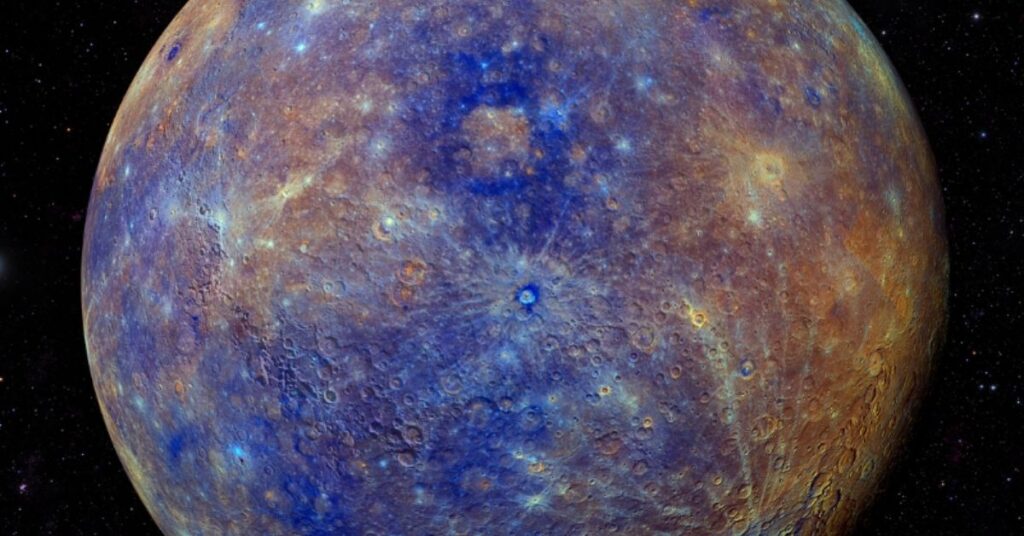All You Want to Know About the Planet Mercury – Astrologically
Mercury is the closest planet to the Sun. Astrologically, Mercury or Budh represents intellect, intelligence, speech, communication, childhood, youth, astrology, diplomacy, transport, proficiency in languages, trading, accountancy, teaching, writing, multiple professions, etc. among many other things. If Sun represents Atma or Soul, and the Moon represents manas or the mind, then Mercury which represents Buddhi or intellect – when combined with Sun and Moon representations forms Ahankaar or the ego/pride. Mercury rules two zodiac signs – Gemini and Virgo, and three Nakshatras – Ashlesha, Jyestha, and Revati. Nature-wise, Mercury is neither benefic nor malefic (though primarily it is considered a benefic planet according to many ancient texts and astrologers), but its true nature depends on its disposition or its placement – if placed with or aspected by a friendly benefic, Mercury behaves as a benefic and vice-versa. Also, if Mercury is placed in the house of its significations, it can act as a benefic (given if the zodiac in that said house is also friendly to Mercury). According to Navgraha Puraan, Mercury is the child of Moon and Tara (the eloped wife of Jupiter). Tara was disinterested in Jupiter’s rituals and became attracted to Soma’s/Moon’s seduction. She also threatened Jupiter with war (which happened eventually) with all the Gods and Jupiter on one end while Moon and the demons on the other end (in collaboration with Daitya-Guru Shukra). Tara, fearing the end of the world because of the ensuing war, returned to Jupiter but had already conceived a child with Moon – none other than Mercury. Astrologically, in terms of Natural Relationships, Mercury considers Sun and Venus as his friends; Saturn, Mars, and Jupiter as neutrals; and Moon as his enemy! Conversely, Moon considers Mercury as a friend. Rahu is sometimes called the best friend of Mercury and is also acknowledged to be the co-owner of Virgo by many astrologers – a sign ruled by Mercury. Naturally, Mercury is strong in Gemini and Virgo – the signs ruled by it. The exaltation point of Mercury is in 15° Virgo, and the Mooltrikona of Mercury also falls in Virgo from 16° to 20°. Friendly zodiac signs of Mercury are Leo (ruled by Sun), Libra and Taurus (both ruled by Venus). Mercury is strong in 2nd, 4th, 5th, 9th, 10th, and 11th Bhavas or houses, but it is strongest when placed in the ascendant or the 1st house. Mercury acts as a neutral planet when placed in Aries, Scorpio (both ruled by Mars), Capricorn, Aquarius (both ruled by Saturn) and Sagittarius (ruled by Jupiter). In terms of houses/Bhavas, Mercury behaves as a neutral in the 3rd house. The debilitation point of Mercury is 15° Pisces – a sign owned by Jupiter (and hence it would not be wrong to call Jupiter an enemy of Mercury – unofficially of course). Also, the exaltation-point of Jupiter (i.e., Cancer zodiac sign) is an enemy sign for Mercury (also because it is ruled by the Moon). Mercury is the significator/Karaka of the 4th and 10th houses (along with other planets), is weak in 6th, 8th, and 12th houses but is the weakest in the 8th house. Because Mercury is close to the Sun naturally, it can be seen combust in many charts. Mercury also goes retrograde at least 3 times a year and is regarded as the messenger of Gods (because it is remarkably close to the Sun – the supreme energy of all universe). Mercury is charming (like a Prince), adaptable, represents childhood, innocence, youth, and everything concerned with childhood. Those who have strong Mercury in their Lagna charts (either own sign, exalted or friendly sign and not in the 8th house, and not aspected by malefics or enemy planets – can be called as a strong positioning) are very youthful throughout their lives, are very child-like or childish, indecisive, have a thirst for gaining knowledge, are easily bored, have a dualistic character, are very changeable in nature and have very good speech or communication capabilities. Mercury is androgynous (neither male or female) and is an asexual planet. It is also impotent and hence been linked with homosexuality. In the field of medical astrology, Mercury often represents the skin (and hence a weak or afflicted Mercury can cause skin ailments like eczema, sores, rashes, etc.). Mercury, when afflicted or weak, can also cause respiratory disorders like breathlessness etc. but one also needs to check the placement of Saturn/Rahu to assess such disorders correctly. A person who has Mercury as the strongest planet (Atma-Karaka) would seem insensitive and would be unable to show or feel any emotions. Mercury, as explained before, is the Karaka of speech and hence such persons can do well in the field of sales and marketing where one must convince a customer to buy a certain product or a service. A weak Mercury shows indecisiveness and changeability. Natives with weak Mercury tend to rely on their emotions rather than their intellect, they are also extremely sensitive sometimes. A weak Mercury with a weaker Moon can give mental ailments such as psychosis, retarded mind, mental disorders, etc. Remedies for a weaker Mercury can include meditation, yoga, praying to Ishta Devataa or refraining from talking unnecessarily. Because a weak Mercury leads to the person making wrong choices in life, such natives should rely on others’ decisions if possible.
All You Want to Know About the Planet Mercury – Astrologically Read More »



 Need help?
Need help?